专题05 期中复习之单项选择50道(答案+解析)(Units 1-4单元话题)--2024-2025学年八年级英语下册单元重难点高频易错题专练(牛津译林版)
文档属性
| 名称 | 专题05 期中复习之单项选择50道(答案+解析)(Units 1-4单元话题)--2024-2025学年八年级英语下册单元重难点高频易错题专练(牛津译林版) | 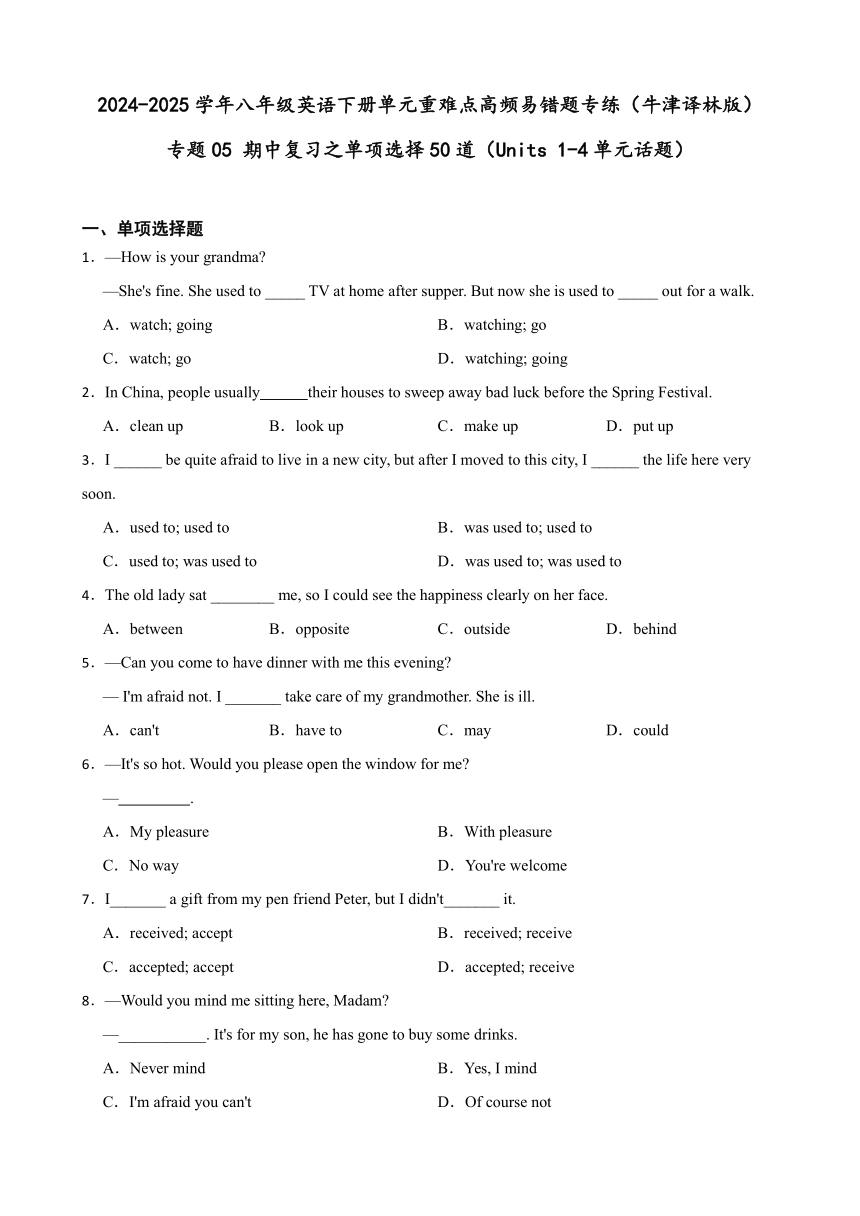 | |
| 格式 | docx | ||
| 文件大小 | 35.2KB | ||
| 资源类型 | 试卷 | ||
| 版本资源 | 牛津译林版 | ||
| 科目 | 英语 | ||
| 更新时间 | 2025-03-15 09:25:15 | ||
图片预览

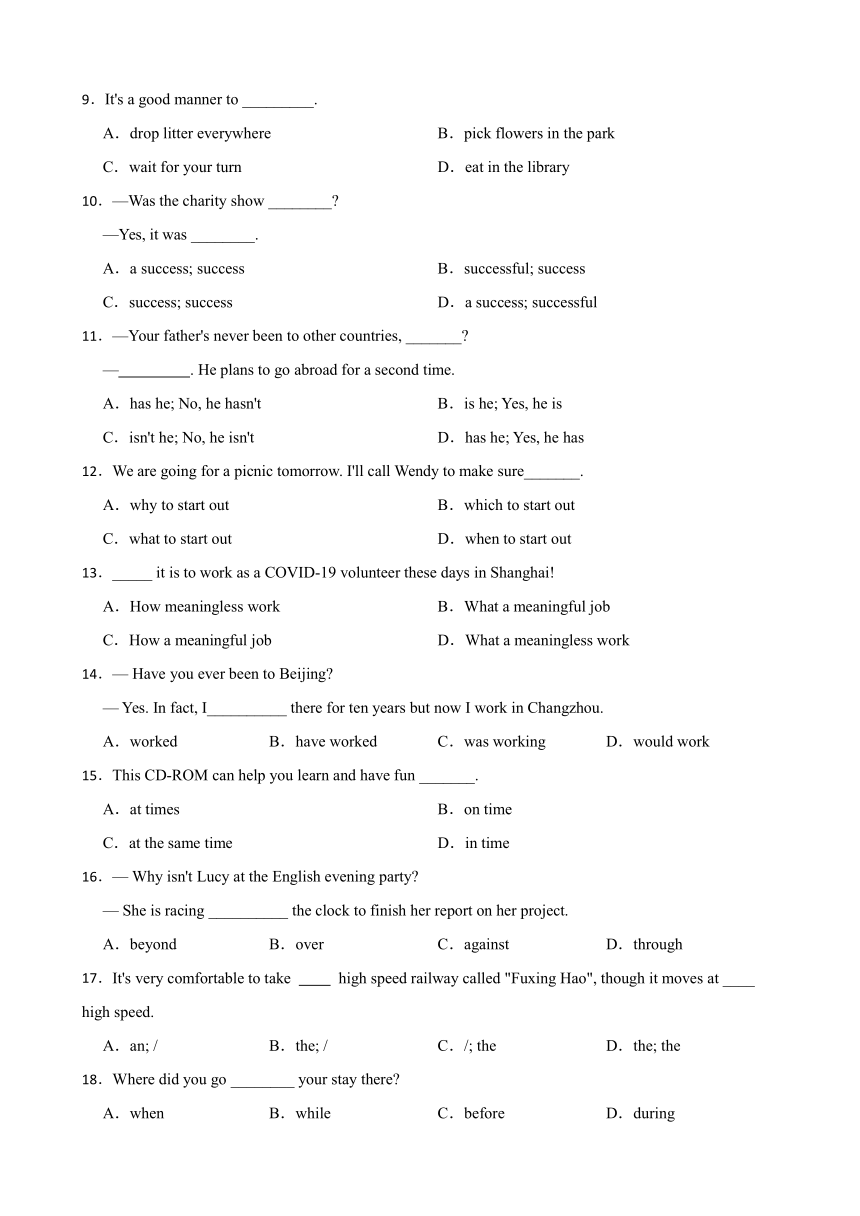
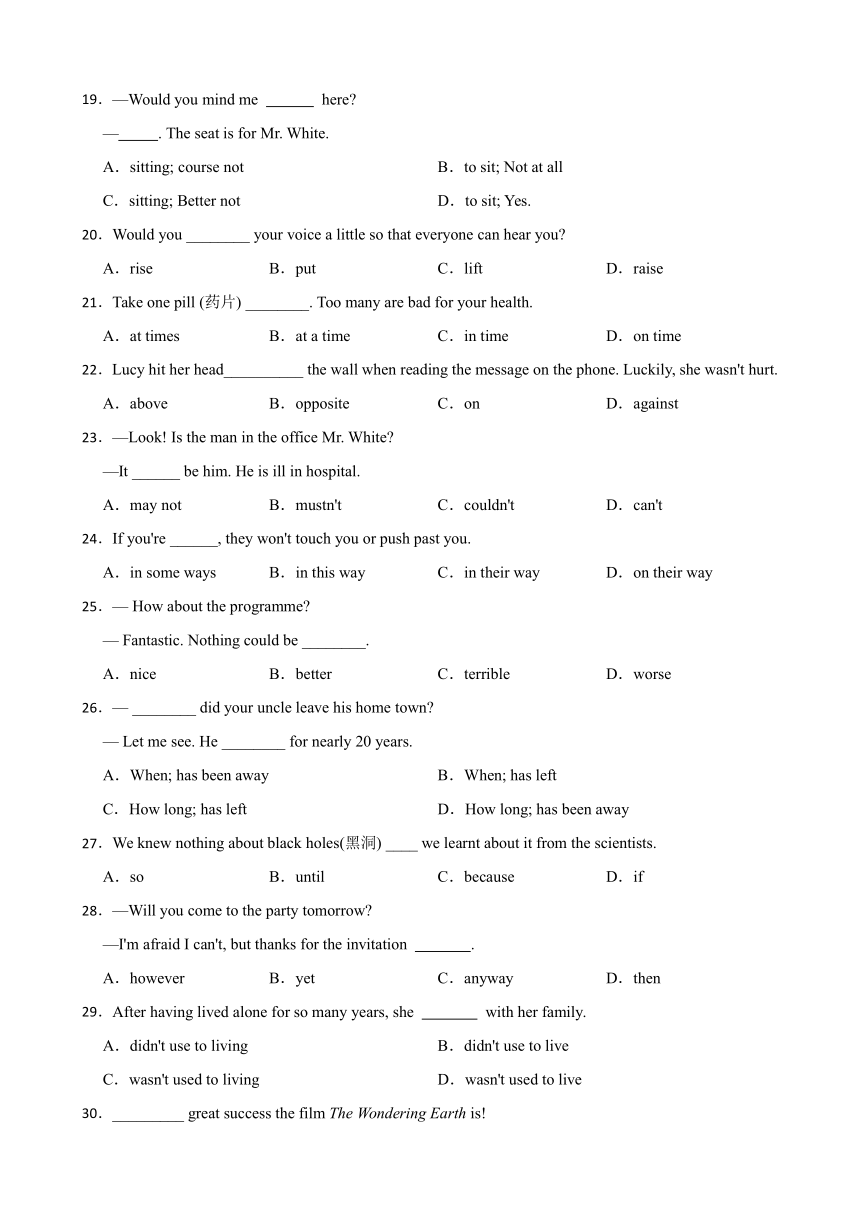
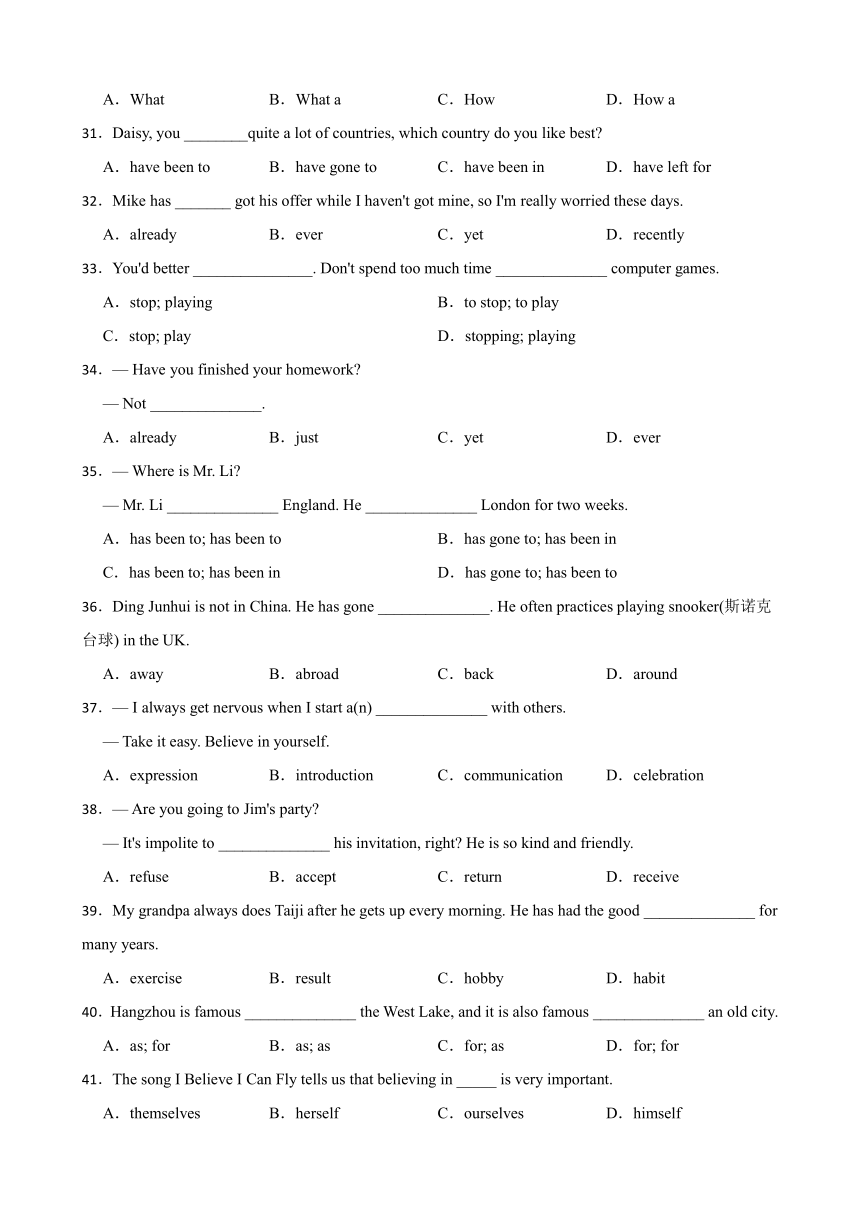
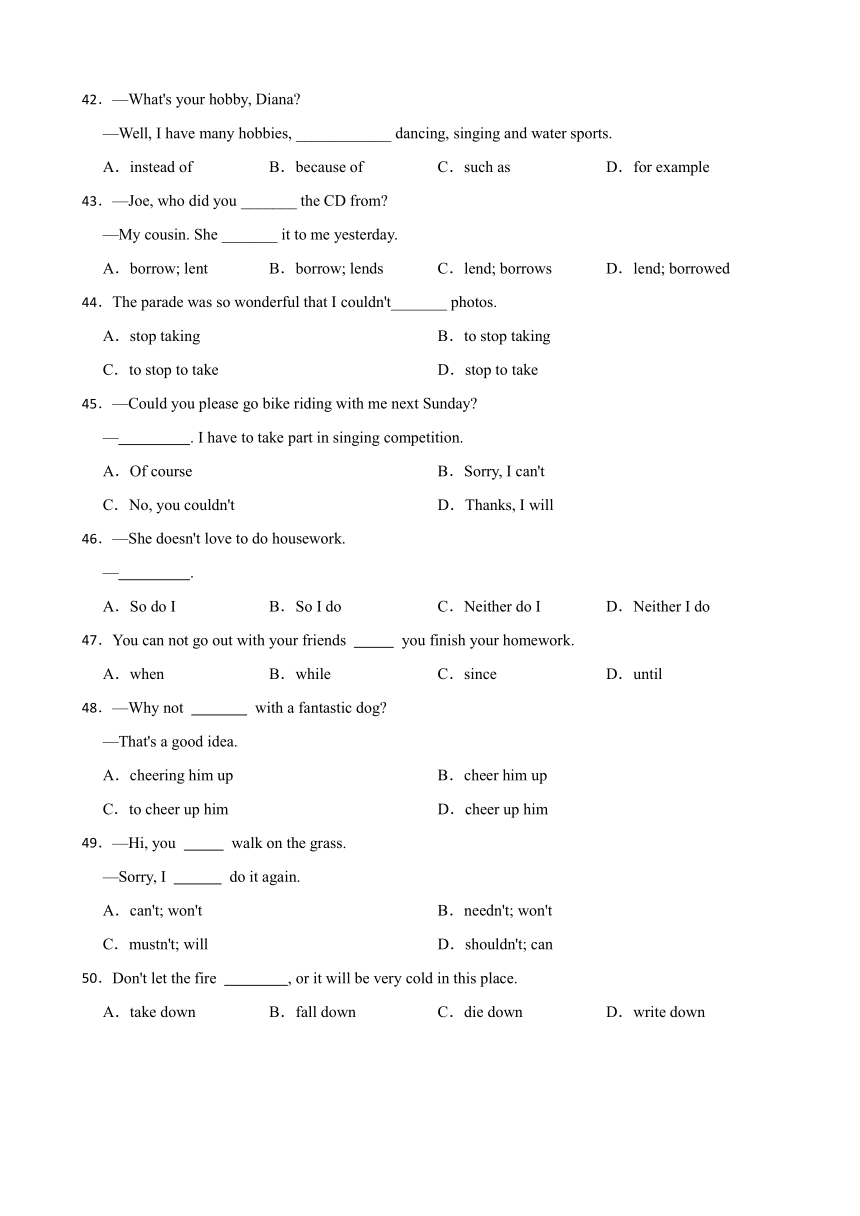
文档简介
2024-2025学年八年级英语下册单元重难点高频易错题专练(牛津译林版)
专题05 期中复习之单项选择50道(Units 1-4单元话题)
一、单项选择题
1.—How is your grandma
—She's fine. She used to _____ TV at home after supper. But now she is used to _____ out for a walk.
A.watch; going B.watching; go
C.watch; go D.watching; going
2.In China, people usually their houses to sweep away bad luck before the Spring Festival.
A.clean up B.look up C.make up D.put up
3.I ______ be quite afraid to live in a new city, but after I moved to this city, I ______ the life here very soon.
A.used to; used to B.was used to; used to
C.used to; was used to D.was used to; was used to
4.The old lady sat ________ me, so I could see the happiness clearly on her face.
A.between B.opposite C.outside D.behind
5.—Can you come to have dinner with me this evening
— I'm afraid not. I _______ take care of my grandmother. She is ill.
A.can't B.have to C.may D.could
6.—It's so hot. Would you please open the window for me
— .
A.My pleasure B.With pleasure
C.No way D.You're welcome
7.I_______ a gift from my pen friend Peter, but I didn't_______ it.
A.received; accept B.received; receive
C.accepted; accept D.accepted; receive
8.—Would you mind me sitting here, Madam
—___________. It's for my son, he has gone to buy some drinks.
A.Never mind B.Yes, I mind
C.I'm afraid you can't D.Of course not
9.It's a good manner to _________.
A.drop litter everywhere B.pick flowers in the park
C.wait for your turn D.eat in the library
10.—Was the charity show ________
—Yes, it was ________.
A.a success; success B.successful; success
C.success; success D.a success; successful
11.—Your father's never been to other countries, _______
— . He plans to go abroad for a second time.
A.has he; No, he hasn't B.is he; Yes, he is
C.isn't he; No, he isn't D.has he; Yes, he has
12.We are going for a picnic tomorrow. I'll call Wendy to make sure_______.
A.why to start out B.which to start out
C.what to start out D.when to start out
13._____ it is to work as a COVID-19 volunteer these days in Shanghai!
A.How meaningless work B.What a meaningful job
C.How a meaningful job D.What a meaningless work
14.— Have you ever been to Beijing
— Yes. In fact, I__________ there for ten years but now I work in Changzhou.
A.worked B.have worked C.was working D.would work
15.This CD-ROM can help you learn and have fun _______.
A.at times B.on time
C.at the same time D.in time
16.— Why isn't Lucy at the English evening party
— She is racing __________ the clock to finish her report on her project.
A.beyond B.over C.against D.through
17.It's very comfortable to take high speed railway called "Fuxing Hao", though it moves at ____ high speed.
A.an; / B.the; / C./; the D.the; the
18.Where did you go ________ your stay there
A.when B.while C.before D.during
19.—Would you mind me here
— . The seat is for Mr. White.
A.sitting; course not B.to sit; Not at all
C.sitting; Better not D.to sit; Yes.
20.Would you ________ your voice a little so that everyone can hear you
A.rise B.put C.lift D.raise
21.Take one pill (药片) ________. Too many are bad for your health.
A.at times B.at a time C.in time D.on time
22.Lucy hit her head__________ the wall when reading the message on the phone. Luckily, she wasn't hurt.
A.above B.opposite C.on D.against
23.—Look! Is the man in the office Mr. White
—It ______ be him. He is ill in hospital.
A.may not B.mustn't C.couldn't D.can't
24.If you're ______, they won't touch you or push past you.
A.in some ways B.in this way C.in their way D.on their way
25.— How about the programme
— Fantastic. Nothing could be ________.
A.nice B.better C.terrible D.worse
26.— ________ did your uncle leave his home town
— Let me see. He ________ for nearly 20 years.
A.When; has been away B.When; has left
C.How long; has left D.How long; has been away
27.We knew nothing about black holes(黑洞) ____ we learnt about it from the scientists.
A.so B.until C.because D.if
28.—Will you come to the party tomorrow
—I'm afraid I can't, but thanks for the invitation .
A.however B.yet C.anyway D.then
29.After having lived alone for so many years, she with her family.
A.didn't use to living B.didn't use to live
C.wasn't used to living D.wasn't used to live
30._________ great success the film The Wondering Earth is!
A.What B.What a C.How D.How a
31.Daisy, you ________quite a lot of countries, which country do you like best
A.have been to B.have gone to C.have been in D.have left for
32.Mike has _______ got his offer while I haven't got mine, so I'm really worried these days.
A.already B.ever C.yet D.recently
33.You'd better _______________. Don't spend too much time ______________ computer games.
A.stop; playing B.to stop; to play
C.stop; play D.stopping; playing
34.— Have you finished your homework
— Not ______________.
A.already B.just C.yet D.ever
35.— Where is Mr. Li
— Mr. Li ______________ England. He ______________ London for two weeks.
A.has been to; has been to B.has gone to; has been in
C.has been to; has been in D.has gone to; has been to
36.Ding Junhui is not in China. He has gone ______________. He often practices playing snooker(斯诺克台球) in the UK.
A.away B.abroad C.back D.around
37.— I always get nervous when I start a(n) ______________ with others.
— Take it easy. Believe in yourself.
A.expression B.introduction C.communication D.celebration
38.— Are you going to Jim's party
— It's impolite to ______________ his invitation, right He is so kind and friendly.
A.refuse B.accept C.return D.receive
39.My grandpa always does Taiji after he gets up every morning. He has had the good ______________ for many years.
A.exercise B.result C.hobby D.habit
40.Hangzhou is famous ______________ the West Lake, and it is also famous ______________ an old city.
A.as; for B.as; as C.for; as D.for; for
41.The song I Believe I Can Fly tells us that believing in _____ is very important.
A.themselves B.herself C.ourselves D.himself
42.—What's your hobby, Diana
—Well, I have many hobbies, ____________ dancing, singing and water sports.
A.instead of B.because of C.such as D.for example
43.—Joe, who did you _______ the CD from
—My cousin. She _______ it to me yesterday.
A.borrow; lent B.borrow; lends C.lend; borrows D.lend; borrowed
44.The parade was so wonderful that I couldn't_______ photos.
A.stop taking B.to stop taking
C.to stop to take D.stop to take
45.—Could you please go bike riding with me next Sunday
— . I have to take part in singing competition.
A.Of course B.Sorry, I can't
C.No, you couldn't D.Thanks, I will
46.—She doesn't love to do housework.
— .
A.So do I B.So I do C.Neither do I D.Neither I do
47.You can not go out with your friends you finish your homework.
A.when B.while C.since D.until
48.—Why not with a fantastic dog
—That's a good idea.
A.cheering him up B.cheer him up
C.to cheer up him D.cheer up him
49.—Hi, you walk on the grass.
—Sorry, I do it again.
A.can't; won't B.needn't; won't
C.mustn't; will D.shouldn't; can
50.Don't let the fire , or it will be very cold in this place.
A.take down B.fall down C.die down D.write down
答案解析部分
1.A
——你奶奶好吗?——她很好。她过去常常晚饭后在家看电视。但是现在她已经习惯出去散步了。watch看,动词原形,watching看,动名词;going去,动名词;go动词原形,去。used to过去常常,后跟动词原形;be used to习惯于,后跟名词,代词或动名词,根据两个空前面的use to和is used to可知第一个空为动词原形,第二个空为动名词,故答案为A。
考查动词原形和动名词的用法。识记固定搭配的用法。
2.A
在中国,人们通常在春节前打扫房屋以扫除厄运。clean up打扫,清扫;look up抬头看,查阅;make up编造;组成;put up举起,搭建;根据常识可知在中国,春节前人们通常是打扫房子,故答案为A。
考查短语辨析。理解句意并识记不同短语的意义,找到符合题意的短语。
3.C
我以前很害怕住在一个新的城市,但我搬到这个城市后,很快就习惯了这里的生活。固定短语 used to do sth.,曾经做过某事,过去常常做某事;be used to doing sth.,习惯于做某事;根据 but after ,可知空一是以前做的事,填used to,空二是习惯新生活,was used to,选C。
此题考查固定短语。注意used to do.和be used to doing的区别。
4.B
老太太坐在我对面,所以我能清楚地看到她脸上的幸福。between 在……和……两者之间;opposite在……的对面;outside在外面;behind在……的后面。根据 I could see the happiness clearly on her face,可知坐在对面,故选B。
考查介词辨析。根据上下文的联系确定所使用的介词。
5.B
—今天晚上你能和我一起共进晚餐吗?—我恐怕不能。我不得不去照顾我的祖母。她生病了。can't不可能,表示有把握的推测;have to,必须,不得不,表示客观上的要求;may可能,表示没有把握的推测; could可能,表示没有把握的推测。根据后一句的She is ill.可知祖母生病了,我必须照顾她,这是不得不做的事,故用情态动词have to,故选B。
6.B
——太热了。请你帮我打开窗户好吗 ——非常乐意。My pleasure不客气;With pleasure非常乐意;No way不可能;You're welcome 不客气;根据 Would you please open the window for me 可知这里是回答上文的请求,B选项符合题意,故答案为B。
考查情景交际。识记常用的日常用语。
7.A
我收到笔友彼得送我的礼物,但我没有接受。receive通常指被动地“收到”或“接到”,而accept 则指主动地“接受”。根据句意可知是我收到了礼物,但我没有接受,故答案为A。
考查词义辨析。注意识记动词receive和accept的区别。
8.C
——夫人,我坐在这儿您介意吗?——恐怕不行。这是给我儿子的,他去买饮料了。 Never mind没关系; Yes, I mind 是的,我介意;I'm afraid you can't恐怕你不能;Of course not当然不;根据 It's for my son 可知是这里应该是委婉的拒绝,C选项符合题意,故答案为C。
考查情景交际。识记常用的日常用语。
9.C
等待轮到你有礼貌的。drop litter everywhere,到处扔垃圾;pick flowers in the park,在公园摘花;wait for your turn,等着轮到你; eat in the library,在图书馆吃东西;根据生活常识可知等着轮到你是有礼貌的,故答案为C。
考查生活常识。理解句意并识记选项的意义,找到符合题意的选项。
10.D
——慈善演出成功了吗?——是的,很成功。success成功,名词,可做可数名词或不可数名词,做可数名词时指成功的人或事,successful形容词,成功的;根据问句 Was the charity show 和答语可知这里是询问这次的慈善演出是否成功,两个空都是在be动词was后做表语,如果用名词,表示是一件成功的事,要加不定冠词a,也可以用形容词做表语。所以两个空均可以是名词a success 或形容词successful,故答案为D。
考查可数名词和形容词。识记名词success和形容词successful的用法。
11.D
——你父亲从未去过其他国家,是吗?——不,他去过。他计划第二次出国。句子是反义疑问句,根据 Your father's never been to other countries可知句子是现在完成时的否定句,疑问部分用肯定形式,助动词has+主语,your father用he来代替,所以第一个空为has he;根据He plans to go abroad for a second time. 可知他去过国外,是肯定回答,用yes,主语+助动词,故答案为D。
考查反义疑问句及其答语。注意识记“前否后肯”形式的问句,答语中的yes和no翻译成汉语正好是相反的。英语回答只看事实情况,事实是肯定的,就用yes作答,事实的否定的,就用no作答。
12.D
我们明天要去野餐。我会打电话给温蒂确定什么时候出发。 why to start out为什么出发;which to start out哪一个出发;what to start out什么出发;when to start out什么时候出发; 结合句意可知什么时候出发符合题意,故答案为D。
考查疑问词辨析。理解句意并识记不同疑问词的用法。
13.B
最近在上海做一名新冠志愿者是一份多么有意义的工作啊!句子是感叹句,根据感叹句的结构:What a/an+形容词+可数名词单数+主语+谓语动词或者What+形容词+可数名词复数或不可数名词+主语+谓语动词;How+形容词+a/an+可数名词单数+主语+谓语动词或How+形容词或副词+主语+谓语动词!work不可数名词,不能带不定冠词,job可数名词,用what感叹句,ACD选项均错误,故答案为B。
考查what感叹句。识记感叹句的结构和用法。
14.A
——你去过北京吗?——是的。事实上,我在那里工作了十年,但现在我在常州工作。worked工作,一般过去时;have worked现在完成时;was working过去进行时;would work过去将来时;根据for ten years but now I work in Changzhou.可知我现在常州工作,所以在北京工作是过去的动作,用一般过去时,故答案为A。
考查一般过去时。理解句意识记不同时态的构成和用法。
15.C
这张光盘可以帮助你学习,同时获得乐趣。at times有时;on time准时;at the same time同时;in time及时;根据help you learn 和and have fun可知这里是表示光盘可以帮助学习,同时也可以获得乐趣,故答案为C。
考查短语辨析。理解题意和短语的意思,找到符合题意的选项。
16.C
——为什么露西没有参加英语晚会?——她在争分夺秒地完成她的项目报告。beyond晚于,迟于,包括;over在……之上,超过;against反对,与……竞争;through通过;根据问句Why isn't Lucy at the English evening party和固定搭配race against the clock,争分夺秒,可知她是在争分夺秒的完成她的项目报告,against,符合题意,故答案为C。
考查介词辨析。识记固定搭配中介词的用法。
17.B
乘坐名为“复兴号”的高速铁路非常舒适,尽管它的速度很高。an不定冠词,意思是“一个”,表示泛指;the定冠词,表示特指;/零冠词;第一个空根据 called "Fuxing Hao" 可知在确定的高铁,用定冠词。at high speed全速,高速,固定搭配,所以第二个空用零冠词,故答案为B。
考查冠词。识记定冠词和零冠词的用法。
18.D
在你呆在那里的期间,你去了哪里?when 当……的时候;while 当……的时候before 在……之前;during 在……期间。when和while后跟一个句子,during后跟时间状语或者短语,因为其后跟“your stay”,所以用during代入句子表示在你呆在那里的期间。故选D。
考查时间状语。when和while的用法一致,从结构上去区别词与词之间的用法也是一种方法。
19.C
——你介意我坐在这里吗?——最好不要。这个座位是给怀特先生的。根据“mind doing sth,介意做某事”可知,此处要用动词ing形式;根据下文 The seat is for Mr. White可知,这个位置是给怀特先生的,说明不可以坐在这里,但对于“Would you mind doing”的回答需要用委婉的语句。故选C。
考查固定搭配和情景用语。注意识记固定短语的搭配和意思,以及用Would you来提问的相关的肯定回答和否定回答。
20.D
你可以提高一点你的音量便于每个人都能听到吗?rise 上涨;put 放置;lift 举起;raise 提高(音量)。根据动作的对象是“ your voice ”结合“ everyone can hear you ”可知,要每个人都能听到就要提高音量。故选D。
考查动词辨析。易错:rise和raise在词形上相似,在意思上也相似,音量的提高要用raise,这是易错点。
21.B
每次服一粒药。太多了会对健康不好。at times 有时;at a time 每次;in time 及时;on time 按时。根据常识可知,药有剂量,规定每次只能吃多少,如果太多对身体不好。故选B。
考查介词短语。注意熟记at times和at a time的区别,意思记混就会选错。
22.D
露西在看电话信息时撞到了墙上。 幸运的是,她没有受伤。above 在……上面;opposite 在……对面;on 在……上面(有接触);against 碰(到)。根据句意可知,头撞到墙了,against有撞到,碰到的意思,符合语境。故选D。
考查介词辨析。易错分析:熟记介词的意思再代入文中翻译可知,本题有可能误选到on。
23.D
——看!在办公室的男人是怀特先生吗?——这不可能是他,他生病住院了。表示推测时,can用在否定含义的句子,must用在肯定含义的句子,表示不可能用can't。故选D。
考查情态动词。易错:本题易误选成mustn't,在表示禁止某事时才有mustn't。
24.C
如果你挡到了他们的路,他们不会触碰不过你或者推开你。in some ways 在某种程度上;in this way 用这种方法;in their way 挡道;on their way 在……途中。根据下文they won't touch you or push past you可知,不会碰你也不会推开你,就算是挡着他们的路了。故选C。
考查介词短语。熟记相似短语的意思,尤其是介词的区别,这是解题的关键。
25.B
——节目怎么样?——太棒了。没有比这更好的了。A. nice美好的,愉快的;B. better更好的(地);C. terrible非常讨厌的,可怕的;D. worse更差,更糟。根据Fantastic,可知是很好,否定句中有形容词或副词比较级表达最高级的意思。Nothing could be better,意思是没有比这更好的事了,也就是说这是最好的事了,故选B。
考查形容词比较级。掌握一些常用的句式结构。
26.A
——你叔叔什么时候离开家乡的?——让我想一想。他离开家已经近20年了。①when:什么时候,询问某个时间点,how long:多久,多长时间,询问做某事做了多长时间(时间段),②leave离开,瞬间动词,不可和表示时间段的时间状语一起使用,be away:离开,表示一种状态,可以和表示时间段的时间状语一起使用。第一句中有leave,可知填When;第2句中时间状语for nearly 20 years是时间段,可知填has been away,故选A。
考查特殊疑问句和动词辨析。注意短暂性动词和延续性动词的区别。
27.B
在我们从科学家那里了解它之前,我们对黑洞一无所知。A. so因此,所以,并列连词,表示因果关系,so后面跟结果;B. until直到,在…以前,引导时间状语从句;C. because因为,表示因果关系,后面跟原因;D. if如果,引导条件状语从句。not…until…:直到……才……,在……以前,……不做……,not也可用表示否定词代替,此处是时间状语从句,其它连词放在此处,句子翻译不通,故选B。
考查连词辨析。弄清各个连词的使用规则。
28.C
——你明天会来参加聚会吗?——恐怕不行,不过还是谢谢你的邀请。A. however然而;B. yet仍然,还;C. anyway不管怎样;D. then然后。根据上文I'm afraid can't, but thanks for the invitation可知,这里是不管怎样,故选C。
此题考查副词使用。根据上下文的联系确定所使用的副词。
29.C
在独自生活了这么多年之后,她不习惯和家人住在一起。used to do sth.:曾经做某事,过去做某事,be used to doing sth.,习惯于做某事。结合After having lived alone for so many years, 可知她不习惯和家人一起住,故选C。
考查动词短语。注意used to do sth和be used to doing的区别。
30.B
这部《流浪地球》电影是多么成功啊!英语感叹句由what和how引导。How修饰形容词副词,what修饰名词。其构成:①How+形容词或副词+主语+谓语!②What a/an +形容词+可数名词单数+主语+谓语!③What +形容词+不可数名词/可数名词复数+主语+谓语!success 是抽象名词,但当指一个具体的人或一件具体的事情时是可数名词。本句指具体的一件事,可知使用what a 引导此感叹句。故选B。
考查感叹句。注意感叹句的引导词的使用规则。
31.A
黛西,你去过很多国家,你最喜欢哪个国家?leave for到……地方去。have been to到过;去过某地,但现在并不在那里;have gone to去了某地,现在仍然在那里;have been in,表示在某地呆了多少时间,常与时间段状语连用;根据which country do you like best,可知是去过很多国家,故选A。
考查动词短语辨析。弄清所给短语的意思和使用方法,根据上下文的联系确定所使用的短语。
32.A
迈克已经得到了他的录取通知,而我还没有,所以这些天我真的很担心。already已经,和现在完成时的肯定结构连用;ever曾经;yet然而,和现在完成时的否定句或疑问句连用;recently最近。根据while I haven't got mine,可知迈克已经得到,故选A。
考查副词辨析。根据上下文的联系确定句子所缺的名词。
33.A
你最好停下来。不要花太多时间在电脑游戏上。固定搭配,had better do sth,最好做某事。固定搭配,spend...(in) doing sth,花费时间做某事。故选A。
考查固定搭配。注意识记固定搭配had better do sth和spend...(in) doing sth。
34.C
——你已经完成你的作业了吗?——还没有。A already已经,常用于肯定句中,常放在句中;B just仅仅;C yet还,常用于否定句和疑问句中,放在句尾;D ever曾经。根据Not可知是否定回答,又在句尾,故选C。
考查副词辨析。注意already和yet的用法区别。
35.B
——李先生在哪里?——李先生去了英国。他在伦敦呆了两周了。 has been to去过,强调去了又回来了;has gone to去了,强调去了但是还没回来; has been in表示呆在某地。 He ______________ London for two weeks. 可知李先生还没回来,因此第一个空选has gone to;根据for two weeks可知用延续性动词 。故选B。
考查短语辨析。注意has been to、has gone to和has been in的区别。
36.B
丁俊晖不在中国。他去了外国。他经常在英国练习打斯诺克台球。A away离开;B abroad在国外;C back回来;D around在周围。根据Ding Junhui is not in China. 可知他去了外国。故选B。
考查副词辨析。注意根据句意选择合适的选项。
37.C
——当我与他人开始交流时,我总是会感到紧张。——别紧张。相信你自己。A expression表达;B introduction介绍;C communication交流;D celebration庆祝。固定搭配,communicate with sb,和某人交流。communicate的名词形式是communication。故选C。
考查名词辨析。注意固定搭配communicate with sb的用法。注意communicate的名词形式是communication。
38.A
——你去参加吉姆的派对吗?——拒绝他的邀请是不礼貌的,对吧?他是如此善良和友好。A refuse拒绝;B accept接受;C return归还;D receive接收。根据impolite可知拒绝邀请不礼貌。故选A。
考查动词辨析。注意识记refuse的用法。
39.D
我爷爷每天早上起床后都会打太极拳。多年来,他一直保持良好的习惯。A exercise练习;B result结果;C hobby爱好;D habit习惯。根据My grandpa always does Taiji after he gets up every morning.可知这是好习惯。故选D。
考查名词辨析。注意识记habit的用法。
40.C
杭州因为西湖而著名,也作为古城而著名。固定搭配be famous for,因为……而著名;be famous as,作为……而著名。故选C。
考查固定搭配。注意be famous for和be famous as的用法区别。
41.C
j《我相信我能飞》这首歌告诉我们,相信自己很重要。A:themselves,他们自己;B:herself,她自己;C:ourselves,我们自己;D:himself,他自己。根据句中tells us,告诉我们,可知后面也是相信我们自己,故选C。
考查反身代词的用法。注意根据不同的主语来运用相应人称的反身代词。
42.C
——你的爱好是什么,Diana?——我有许多爱好,例如:跳舞、唱歌、水上运动。A.而不是;B.因为;C.例如,后面没有逗号;D.例如,后面有逗号。跳舞、唱歌和水上运动是爱好的例子,并且没有逗号,所以用such as,故选C。
考查短语辨析,注意平时识记such as和for example的区别,理解句意。
43.A
——乔,你从谁那里借的CD?——我的表妹。她昨天借给我的。borrow:借入,过去式是borrowed,常与from搭配,borrow sth. from sb.:从某处借某物;lend:借出,过去式是lent,常与to搭配,lend sth. to sb.:把某物借给某人。结合句意可知填第一句填borrow;第二句时间状语yesterday可知使用一般过去式,结合句意可知填lent;选A。
考查动词辨析。注意borrow和lend的区别。
44.A
游行太精彩了,我忍不住拍照。固定搭配,can't stop doing sth. 禁不住做某事,故选A。
此题考查固定短语。注意固定搭配can't stop doing sth.
45.B
——下周日你能和我一起去骑自行车吗?——对不起,我不能。我必须去参加歌唱比赛。A:Of course,当然;B:Sorry, I can't对不起,我不能;C:No, you couldn't,不,你不能;D:Thanks, I will,谢谢,我会的。根据下文I have to take part in singing competition.我必须去参加歌唱比赛,可知不能去了,故选B。
考查交际用语,注意根据不同的语境选择正确答语。
46.C
——她不爱做家务。——我也不。A:So do I,我也是,用于肯定句式;B:So I do,确实如此;用于肯定句式;C:Neither do I,我也不;用于否定句式;D:Neither I do,用于否定句式,我也不是,根据She doesn't love to do housework.她不爱做家务,为否定句式,可知是我也不爱做家务,故选C。
考查固定句式的辨析,注意识别句子So do I;So I do; Neither do I;Neither I do。
47.D
直到你完成作业,你才能和你的朋友出去。A:when,当……时;B:while,与此同时;C:since,自从;D:until,直到。固定搭配,not…until,直到……才……,故选D。
考查状语从句引导词辨析,注意识记固定搭配,not…until。
48.B
——为什么不用一只神奇的狗让他高兴起来呢?——那是个好主意。固定搭配,cheer up,使振作起来,当宾语是人称代词宾格的时候,要放在短语中间,Why not句型,后跟动词原形,故选B。
考查动词短语辨析,注意根据语境和人称,运用正确的形式。
49.A
——嗨,你不能在草地上走。——对不起,我不会再那样做了。A:can't,不能; won't 不会;B:needn't,不需要; won't,不会;C:mustn't,一定不能; will,将会;D:shouldn't,不应该; can,能。根据walk on the grass,在草地上走,可知是不能在上面走;答语里面说不会再那样做了,须用will not,缩写为won't,故选A。
考查情态动词的用法,注意区分can't; won't;needn't;mustn't; will;shouldn't; can。
50.C
不要让火熄灭,否则这个地方会很冷。A:take down,取下;B:fall down,失败,跌倒;C:die down,平息,熄灭;D:write down,写下,根据句子or it will be very cold in this place.否则这个地方会很冷,可知是不要让火熄灭,故选C。
考查动词短语辨析,注意识别短语take down,fall down,die down,write down。
专题05 期中复习之单项选择50道(Units 1-4单元话题)
一、单项选择题
1.—How is your grandma
—She's fine. She used to _____ TV at home after supper. But now she is used to _____ out for a walk.
A.watch; going B.watching; go
C.watch; go D.watching; going
2.In China, people usually their houses to sweep away bad luck before the Spring Festival.
A.clean up B.look up C.make up D.put up
3.I ______ be quite afraid to live in a new city, but after I moved to this city, I ______ the life here very soon.
A.used to; used to B.was used to; used to
C.used to; was used to D.was used to; was used to
4.The old lady sat ________ me, so I could see the happiness clearly on her face.
A.between B.opposite C.outside D.behind
5.—Can you come to have dinner with me this evening
— I'm afraid not. I _______ take care of my grandmother. She is ill.
A.can't B.have to C.may D.could
6.—It's so hot. Would you please open the window for me
— .
A.My pleasure B.With pleasure
C.No way D.You're welcome
7.I_______ a gift from my pen friend Peter, but I didn't_______ it.
A.received; accept B.received; receive
C.accepted; accept D.accepted; receive
8.—Would you mind me sitting here, Madam
—___________. It's for my son, he has gone to buy some drinks.
A.Never mind B.Yes, I mind
C.I'm afraid you can't D.Of course not
9.It's a good manner to _________.
A.drop litter everywhere B.pick flowers in the park
C.wait for your turn D.eat in the library
10.—Was the charity show ________
—Yes, it was ________.
A.a success; success B.successful; success
C.success; success D.a success; successful
11.—Your father's never been to other countries, _______
— . He plans to go abroad for a second time.
A.has he; No, he hasn't B.is he; Yes, he is
C.isn't he; No, he isn't D.has he; Yes, he has
12.We are going for a picnic tomorrow. I'll call Wendy to make sure_______.
A.why to start out B.which to start out
C.what to start out D.when to start out
13._____ it is to work as a COVID-19 volunteer these days in Shanghai!
A.How meaningless work B.What a meaningful job
C.How a meaningful job D.What a meaningless work
14.— Have you ever been to Beijing
— Yes. In fact, I__________ there for ten years but now I work in Changzhou.
A.worked B.have worked C.was working D.would work
15.This CD-ROM can help you learn and have fun _______.
A.at times B.on time
C.at the same time D.in time
16.— Why isn't Lucy at the English evening party
— She is racing __________ the clock to finish her report on her project.
A.beyond B.over C.against D.through
17.It's very comfortable to take high speed railway called "Fuxing Hao", though it moves at ____ high speed.
A.an; / B.the; / C./; the D.the; the
18.Where did you go ________ your stay there
A.when B.while C.before D.during
19.—Would you mind me here
— . The seat is for Mr. White.
A.sitting; course not B.to sit; Not at all
C.sitting; Better not D.to sit; Yes.
20.Would you ________ your voice a little so that everyone can hear you
A.rise B.put C.lift D.raise
21.Take one pill (药片) ________. Too many are bad for your health.
A.at times B.at a time C.in time D.on time
22.Lucy hit her head__________ the wall when reading the message on the phone. Luckily, she wasn't hurt.
A.above B.opposite C.on D.against
23.—Look! Is the man in the office Mr. White
—It ______ be him. He is ill in hospital.
A.may not B.mustn't C.couldn't D.can't
24.If you're ______, they won't touch you or push past you.
A.in some ways B.in this way C.in their way D.on their way
25.— How about the programme
— Fantastic. Nothing could be ________.
A.nice B.better C.terrible D.worse
26.— ________ did your uncle leave his home town
— Let me see. He ________ for nearly 20 years.
A.When; has been away B.When; has left
C.How long; has left D.How long; has been away
27.We knew nothing about black holes(黑洞) ____ we learnt about it from the scientists.
A.so B.until C.because D.if
28.—Will you come to the party tomorrow
—I'm afraid I can't, but thanks for the invitation .
A.however B.yet C.anyway D.then
29.After having lived alone for so many years, she with her family.
A.didn't use to living B.didn't use to live
C.wasn't used to living D.wasn't used to live
30._________ great success the film The Wondering Earth is!
A.What B.What a C.How D.How a
31.Daisy, you ________quite a lot of countries, which country do you like best
A.have been to B.have gone to C.have been in D.have left for
32.Mike has _______ got his offer while I haven't got mine, so I'm really worried these days.
A.already B.ever C.yet D.recently
33.You'd better _______________. Don't spend too much time ______________ computer games.
A.stop; playing B.to stop; to play
C.stop; play D.stopping; playing
34.— Have you finished your homework
— Not ______________.
A.already B.just C.yet D.ever
35.— Where is Mr. Li
— Mr. Li ______________ England. He ______________ London for two weeks.
A.has been to; has been to B.has gone to; has been in
C.has been to; has been in D.has gone to; has been to
36.Ding Junhui is not in China. He has gone ______________. He often practices playing snooker(斯诺克台球) in the UK.
A.away B.abroad C.back D.around
37.— I always get nervous when I start a(n) ______________ with others.
— Take it easy. Believe in yourself.
A.expression B.introduction C.communication D.celebration
38.— Are you going to Jim's party
— It's impolite to ______________ his invitation, right He is so kind and friendly.
A.refuse B.accept C.return D.receive
39.My grandpa always does Taiji after he gets up every morning. He has had the good ______________ for many years.
A.exercise B.result C.hobby D.habit
40.Hangzhou is famous ______________ the West Lake, and it is also famous ______________ an old city.
A.as; for B.as; as C.for; as D.for; for
41.The song I Believe I Can Fly tells us that believing in _____ is very important.
A.themselves B.herself C.ourselves D.himself
42.—What's your hobby, Diana
—Well, I have many hobbies, ____________ dancing, singing and water sports.
A.instead of B.because of C.such as D.for example
43.—Joe, who did you _______ the CD from
—My cousin. She _______ it to me yesterday.
A.borrow; lent B.borrow; lends C.lend; borrows D.lend; borrowed
44.The parade was so wonderful that I couldn't_______ photos.
A.stop taking B.to stop taking
C.to stop to take D.stop to take
45.—Could you please go bike riding with me next Sunday
— . I have to take part in singing competition.
A.Of course B.Sorry, I can't
C.No, you couldn't D.Thanks, I will
46.—She doesn't love to do housework.
— .
A.So do I B.So I do C.Neither do I D.Neither I do
47.You can not go out with your friends you finish your homework.
A.when B.while C.since D.until
48.—Why not with a fantastic dog
—That's a good idea.
A.cheering him up B.cheer him up
C.to cheer up him D.cheer up him
49.—Hi, you walk on the grass.
—Sorry, I do it again.
A.can't; won't B.needn't; won't
C.mustn't; will D.shouldn't; can
50.Don't let the fire , or it will be very cold in this place.
A.take down B.fall down C.die down D.write down
答案解析部分
1.A
——你奶奶好吗?——她很好。她过去常常晚饭后在家看电视。但是现在她已经习惯出去散步了。watch看,动词原形,watching看,动名词;going去,动名词;go动词原形,去。used to过去常常,后跟动词原形;be used to习惯于,后跟名词,代词或动名词,根据两个空前面的use to和is used to可知第一个空为动词原形,第二个空为动名词,故答案为A。
考查动词原形和动名词的用法。识记固定搭配的用法。
2.A
在中国,人们通常在春节前打扫房屋以扫除厄运。clean up打扫,清扫;look up抬头看,查阅;make up编造;组成;put up举起,搭建;根据常识可知在中国,春节前人们通常是打扫房子,故答案为A。
考查短语辨析。理解句意并识记不同短语的意义,找到符合题意的短语。
3.C
我以前很害怕住在一个新的城市,但我搬到这个城市后,很快就习惯了这里的生活。固定短语 used to do sth.,曾经做过某事,过去常常做某事;be used to doing sth.,习惯于做某事;根据 but after ,可知空一是以前做的事,填used to,空二是习惯新生活,was used to,选C。
此题考查固定短语。注意used to do.和be used to doing的区别。
4.B
老太太坐在我对面,所以我能清楚地看到她脸上的幸福。between 在……和……两者之间;opposite在……的对面;outside在外面;behind在……的后面。根据 I could see the happiness clearly on her face,可知坐在对面,故选B。
考查介词辨析。根据上下文的联系确定所使用的介词。
5.B
—今天晚上你能和我一起共进晚餐吗?—我恐怕不能。我不得不去照顾我的祖母。她生病了。can't不可能,表示有把握的推测;have to,必须,不得不,表示客观上的要求;may可能,表示没有把握的推测; could可能,表示没有把握的推测。根据后一句的She is ill.可知祖母生病了,我必须照顾她,这是不得不做的事,故用情态动词have to,故选B。
6.B
——太热了。请你帮我打开窗户好吗 ——非常乐意。My pleasure不客气;With pleasure非常乐意;No way不可能;You're welcome 不客气;根据 Would you please open the window for me 可知这里是回答上文的请求,B选项符合题意,故答案为B。
考查情景交际。识记常用的日常用语。
7.A
我收到笔友彼得送我的礼物,但我没有接受。receive通常指被动地“收到”或“接到”,而accept 则指主动地“接受”。根据句意可知是我收到了礼物,但我没有接受,故答案为A。
考查词义辨析。注意识记动词receive和accept的区别。
8.C
——夫人,我坐在这儿您介意吗?——恐怕不行。这是给我儿子的,他去买饮料了。 Never mind没关系; Yes, I mind 是的,我介意;I'm afraid you can't恐怕你不能;Of course not当然不;根据 It's for my son 可知是这里应该是委婉的拒绝,C选项符合题意,故答案为C。
考查情景交际。识记常用的日常用语。
9.C
等待轮到你有礼貌的。drop litter everywhere,到处扔垃圾;pick flowers in the park,在公园摘花;wait for your turn,等着轮到你; eat in the library,在图书馆吃东西;根据生活常识可知等着轮到你是有礼貌的,故答案为C。
考查生活常识。理解句意并识记选项的意义,找到符合题意的选项。
10.D
——慈善演出成功了吗?——是的,很成功。success成功,名词,可做可数名词或不可数名词,做可数名词时指成功的人或事,successful形容词,成功的;根据问句 Was the charity show 和答语可知这里是询问这次的慈善演出是否成功,两个空都是在be动词was后做表语,如果用名词,表示是一件成功的事,要加不定冠词a,也可以用形容词做表语。所以两个空均可以是名词a success 或形容词successful,故答案为D。
考查可数名词和形容词。识记名词success和形容词successful的用法。
11.D
——你父亲从未去过其他国家,是吗?——不,他去过。他计划第二次出国。句子是反义疑问句,根据 Your father's never been to other countries可知句子是现在完成时的否定句,疑问部分用肯定形式,助动词has+主语,your father用he来代替,所以第一个空为has he;根据He plans to go abroad for a second time. 可知他去过国外,是肯定回答,用yes,主语+助动词,故答案为D。
考查反义疑问句及其答语。注意识记“前否后肯”形式的问句,答语中的yes和no翻译成汉语正好是相反的。英语回答只看事实情况,事实是肯定的,就用yes作答,事实的否定的,就用no作答。
12.D
我们明天要去野餐。我会打电话给温蒂确定什么时候出发。 why to start out为什么出发;which to start out哪一个出发;what to start out什么出发;when to start out什么时候出发; 结合句意可知什么时候出发符合题意,故答案为D。
考查疑问词辨析。理解句意并识记不同疑问词的用法。
13.B
最近在上海做一名新冠志愿者是一份多么有意义的工作啊!句子是感叹句,根据感叹句的结构:What a/an+形容词+可数名词单数+主语+谓语动词或者What+形容词+可数名词复数或不可数名词+主语+谓语动词;How+形容词+a/an+可数名词单数+主语+谓语动词或How+形容词或副词+主语+谓语动词!work不可数名词,不能带不定冠词,job可数名词,用what感叹句,ACD选项均错误,故答案为B。
考查what感叹句。识记感叹句的结构和用法。
14.A
——你去过北京吗?——是的。事实上,我在那里工作了十年,但现在我在常州工作。worked工作,一般过去时;have worked现在完成时;was working过去进行时;would work过去将来时;根据for ten years but now I work in Changzhou.可知我现在常州工作,所以在北京工作是过去的动作,用一般过去时,故答案为A。
考查一般过去时。理解句意识记不同时态的构成和用法。
15.C
这张光盘可以帮助你学习,同时获得乐趣。at times有时;on time准时;at the same time同时;in time及时;根据help you learn 和and have fun可知这里是表示光盘可以帮助学习,同时也可以获得乐趣,故答案为C。
考查短语辨析。理解题意和短语的意思,找到符合题意的选项。
16.C
——为什么露西没有参加英语晚会?——她在争分夺秒地完成她的项目报告。beyond晚于,迟于,包括;over在……之上,超过;against反对,与……竞争;through通过;根据问句Why isn't Lucy at the English evening party和固定搭配race against the clock,争分夺秒,可知她是在争分夺秒的完成她的项目报告,against,符合题意,故答案为C。
考查介词辨析。识记固定搭配中介词的用法。
17.B
乘坐名为“复兴号”的高速铁路非常舒适,尽管它的速度很高。an不定冠词,意思是“一个”,表示泛指;the定冠词,表示特指;/零冠词;第一个空根据 called "Fuxing Hao" 可知在确定的高铁,用定冠词。at high speed全速,高速,固定搭配,所以第二个空用零冠词,故答案为B。
考查冠词。识记定冠词和零冠词的用法。
18.D
在你呆在那里的期间,你去了哪里?when 当……的时候;while 当……的时候before 在……之前;during 在……期间。when和while后跟一个句子,during后跟时间状语或者短语,因为其后跟“your stay”,所以用during代入句子表示在你呆在那里的期间。故选D。
考查时间状语。when和while的用法一致,从结构上去区别词与词之间的用法也是一种方法。
19.C
——你介意我坐在这里吗?——最好不要。这个座位是给怀特先生的。根据“mind doing sth,介意做某事”可知,此处要用动词ing形式;根据下文 The seat is for Mr. White可知,这个位置是给怀特先生的,说明不可以坐在这里,但对于“Would you mind doing”的回答需要用委婉的语句。故选C。
考查固定搭配和情景用语。注意识记固定短语的搭配和意思,以及用Would you来提问的相关的肯定回答和否定回答。
20.D
你可以提高一点你的音量便于每个人都能听到吗?rise 上涨;put 放置;lift 举起;raise 提高(音量)。根据动作的对象是“ your voice ”结合“ everyone can hear you ”可知,要每个人都能听到就要提高音量。故选D。
考查动词辨析。易错:rise和raise在词形上相似,在意思上也相似,音量的提高要用raise,这是易错点。
21.B
每次服一粒药。太多了会对健康不好。at times 有时;at a time 每次;in time 及时;on time 按时。根据常识可知,药有剂量,规定每次只能吃多少,如果太多对身体不好。故选B。
考查介词短语。注意熟记at times和at a time的区别,意思记混就会选错。
22.D
露西在看电话信息时撞到了墙上。 幸运的是,她没有受伤。above 在……上面;opposite 在……对面;on 在……上面(有接触);against 碰(到)。根据句意可知,头撞到墙了,against有撞到,碰到的意思,符合语境。故选D。
考查介词辨析。易错分析:熟记介词的意思再代入文中翻译可知,本题有可能误选到on。
23.D
——看!在办公室的男人是怀特先生吗?——这不可能是他,他生病住院了。表示推测时,can用在否定含义的句子,must用在肯定含义的句子,表示不可能用can't。故选D。
考查情态动词。易错:本题易误选成mustn't,在表示禁止某事时才有mustn't。
24.C
如果你挡到了他们的路,他们不会触碰不过你或者推开你。in some ways 在某种程度上;in this way 用这种方法;in their way 挡道;on their way 在……途中。根据下文they won't touch you or push past you可知,不会碰你也不会推开你,就算是挡着他们的路了。故选C。
考查介词短语。熟记相似短语的意思,尤其是介词的区别,这是解题的关键。
25.B
——节目怎么样?——太棒了。没有比这更好的了。A. nice美好的,愉快的;B. better更好的(地);C. terrible非常讨厌的,可怕的;D. worse更差,更糟。根据Fantastic,可知是很好,否定句中有形容词或副词比较级表达最高级的意思。Nothing could be better,意思是没有比这更好的事了,也就是说这是最好的事了,故选B。
考查形容词比较级。掌握一些常用的句式结构。
26.A
——你叔叔什么时候离开家乡的?——让我想一想。他离开家已经近20年了。①when:什么时候,询问某个时间点,how long:多久,多长时间,询问做某事做了多长时间(时间段),②leave离开,瞬间动词,不可和表示时间段的时间状语一起使用,be away:离开,表示一种状态,可以和表示时间段的时间状语一起使用。第一句中有leave,可知填When;第2句中时间状语for nearly 20 years是时间段,可知填has been away,故选A。
考查特殊疑问句和动词辨析。注意短暂性动词和延续性动词的区别。
27.B
在我们从科学家那里了解它之前,我们对黑洞一无所知。A. so因此,所以,并列连词,表示因果关系,so后面跟结果;B. until直到,在…以前,引导时间状语从句;C. because因为,表示因果关系,后面跟原因;D. if如果,引导条件状语从句。not…until…:直到……才……,在……以前,……不做……,not也可用表示否定词代替,此处是时间状语从句,其它连词放在此处,句子翻译不通,故选B。
考查连词辨析。弄清各个连词的使用规则。
28.C
——你明天会来参加聚会吗?——恐怕不行,不过还是谢谢你的邀请。A. however然而;B. yet仍然,还;C. anyway不管怎样;D. then然后。根据上文I'm afraid can't, but thanks for the invitation可知,这里是不管怎样,故选C。
此题考查副词使用。根据上下文的联系确定所使用的副词。
29.C
在独自生活了这么多年之后,她不习惯和家人住在一起。used to do sth.:曾经做某事,过去做某事,be used to doing sth.,习惯于做某事。结合After having lived alone for so many years, 可知她不习惯和家人一起住,故选C。
考查动词短语。注意used to do sth和be used to doing的区别。
30.B
这部《流浪地球》电影是多么成功啊!英语感叹句由what和how引导。How修饰形容词副词,what修饰名词。其构成:①How+形容词或副词+主语+谓语!②What a/an +形容词+可数名词单数+主语+谓语!③What +形容词+不可数名词/可数名词复数+主语+谓语!success 是抽象名词,但当指一个具体的人或一件具体的事情时是可数名词。本句指具体的一件事,可知使用what a 引导此感叹句。故选B。
考查感叹句。注意感叹句的引导词的使用规则。
31.A
黛西,你去过很多国家,你最喜欢哪个国家?leave for到……地方去。have been to到过;去过某地,但现在并不在那里;have gone to去了某地,现在仍然在那里;have been in,表示在某地呆了多少时间,常与时间段状语连用;根据which country do you like best,可知是去过很多国家,故选A。
考查动词短语辨析。弄清所给短语的意思和使用方法,根据上下文的联系确定所使用的短语。
32.A
迈克已经得到了他的录取通知,而我还没有,所以这些天我真的很担心。already已经,和现在完成时的肯定结构连用;ever曾经;yet然而,和现在完成时的否定句或疑问句连用;recently最近。根据while I haven't got mine,可知迈克已经得到,故选A。
考查副词辨析。根据上下文的联系确定句子所缺的名词。
33.A
你最好停下来。不要花太多时间在电脑游戏上。固定搭配,had better do sth,最好做某事。固定搭配,spend...(in) doing sth,花费时间做某事。故选A。
考查固定搭配。注意识记固定搭配had better do sth和spend...(in) doing sth。
34.C
——你已经完成你的作业了吗?——还没有。A already已经,常用于肯定句中,常放在句中;B just仅仅;C yet还,常用于否定句和疑问句中,放在句尾;D ever曾经。根据Not可知是否定回答,又在句尾,故选C。
考查副词辨析。注意already和yet的用法区别。
35.B
——李先生在哪里?——李先生去了英国。他在伦敦呆了两周了。 has been to去过,强调去了又回来了;has gone to去了,强调去了但是还没回来; has been in表示呆在某地。 He ______________ London for two weeks. 可知李先生还没回来,因此第一个空选has gone to;根据for two weeks可知用延续性动词 。故选B。
考查短语辨析。注意has been to、has gone to和has been in的区别。
36.B
丁俊晖不在中国。他去了外国。他经常在英国练习打斯诺克台球。A away离开;B abroad在国外;C back回来;D around在周围。根据Ding Junhui is not in China. 可知他去了外国。故选B。
考查副词辨析。注意根据句意选择合适的选项。
37.C
——当我与他人开始交流时,我总是会感到紧张。——别紧张。相信你自己。A expression表达;B introduction介绍;C communication交流;D celebration庆祝。固定搭配,communicate with sb,和某人交流。communicate的名词形式是communication。故选C。
考查名词辨析。注意固定搭配communicate with sb的用法。注意communicate的名词形式是communication。
38.A
——你去参加吉姆的派对吗?——拒绝他的邀请是不礼貌的,对吧?他是如此善良和友好。A refuse拒绝;B accept接受;C return归还;D receive接收。根据impolite可知拒绝邀请不礼貌。故选A。
考查动词辨析。注意识记refuse的用法。
39.D
我爷爷每天早上起床后都会打太极拳。多年来,他一直保持良好的习惯。A exercise练习;B result结果;C hobby爱好;D habit习惯。根据My grandpa always does Taiji after he gets up every morning.可知这是好习惯。故选D。
考查名词辨析。注意识记habit的用法。
40.C
杭州因为西湖而著名,也作为古城而著名。固定搭配be famous for,因为……而著名;be famous as,作为……而著名。故选C。
考查固定搭配。注意be famous for和be famous as的用法区别。
41.C
j《我相信我能飞》这首歌告诉我们,相信自己很重要。A:themselves,他们自己;B:herself,她自己;C:ourselves,我们自己;D:himself,他自己。根据句中tells us,告诉我们,可知后面也是相信我们自己,故选C。
考查反身代词的用法。注意根据不同的主语来运用相应人称的反身代词。
42.C
——你的爱好是什么,Diana?——我有许多爱好,例如:跳舞、唱歌、水上运动。A.而不是;B.因为;C.例如,后面没有逗号;D.例如,后面有逗号。跳舞、唱歌和水上运动是爱好的例子,并且没有逗号,所以用such as,故选C。
考查短语辨析,注意平时识记such as和for example的区别,理解句意。
43.A
——乔,你从谁那里借的CD?——我的表妹。她昨天借给我的。borrow:借入,过去式是borrowed,常与from搭配,borrow sth. from sb.:从某处借某物;lend:借出,过去式是lent,常与to搭配,lend sth. to sb.:把某物借给某人。结合句意可知填第一句填borrow;第二句时间状语yesterday可知使用一般过去式,结合句意可知填lent;选A。
考查动词辨析。注意borrow和lend的区别。
44.A
游行太精彩了,我忍不住拍照。固定搭配,can't stop doing sth. 禁不住做某事,故选A。
此题考查固定短语。注意固定搭配can't stop doing sth.
45.B
——下周日你能和我一起去骑自行车吗?——对不起,我不能。我必须去参加歌唱比赛。A:Of course,当然;B:Sorry, I can't对不起,我不能;C:No, you couldn't,不,你不能;D:Thanks, I will,谢谢,我会的。根据下文I have to take part in singing competition.我必须去参加歌唱比赛,可知不能去了,故选B。
考查交际用语,注意根据不同的语境选择正确答语。
46.C
——她不爱做家务。——我也不。A:So do I,我也是,用于肯定句式;B:So I do,确实如此;用于肯定句式;C:Neither do I,我也不;用于否定句式;D:Neither I do,用于否定句式,我也不是,根据She doesn't love to do housework.她不爱做家务,为否定句式,可知是我也不爱做家务,故选C。
考查固定句式的辨析,注意识别句子So do I;So I do; Neither do I;Neither I do。
47.D
直到你完成作业,你才能和你的朋友出去。A:when,当……时;B:while,与此同时;C:since,自从;D:until,直到。固定搭配,not…until,直到……才……,故选D。
考查状语从句引导词辨析,注意识记固定搭配,not…until。
48.B
——为什么不用一只神奇的狗让他高兴起来呢?——那是个好主意。固定搭配,cheer up,使振作起来,当宾语是人称代词宾格的时候,要放在短语中间,Why not句型,后跟动词原形,故选B。
考查动词短语辨析,注意根据语境和人称,运用正确的形式。
49.A
——嗨,你不能在草地上走。——对不起,我不会再那样做了。A:can't,不能; won't 不会;B:needn't,不需要; won't,不会;C:mustn't,一定不能; will,将会;D:shouldn't,不应该; can,能。根据walk on the grass,在草地上走,可知是不能在上面走;答语里面说不会再那样做了,须用will not,缩写为won't,故选A。
考查情态动词的用法,注意区分can't; won't;needn't;mustn't; will;shouldn't; can。
50.C
不要让火熄灭,否则这个地方会很冷。A:take down,取下;B:fall down,失败,跌倒;C:die down,平息,熄灭;D:write down,写下,根据句子or it will be very cold in this place.否则这个地方会很冷,可知是不要让火熄灭,故选C。
考查动词短语辨析,注意识别短语take down,fall down,die down,write down。
同课章节目录
